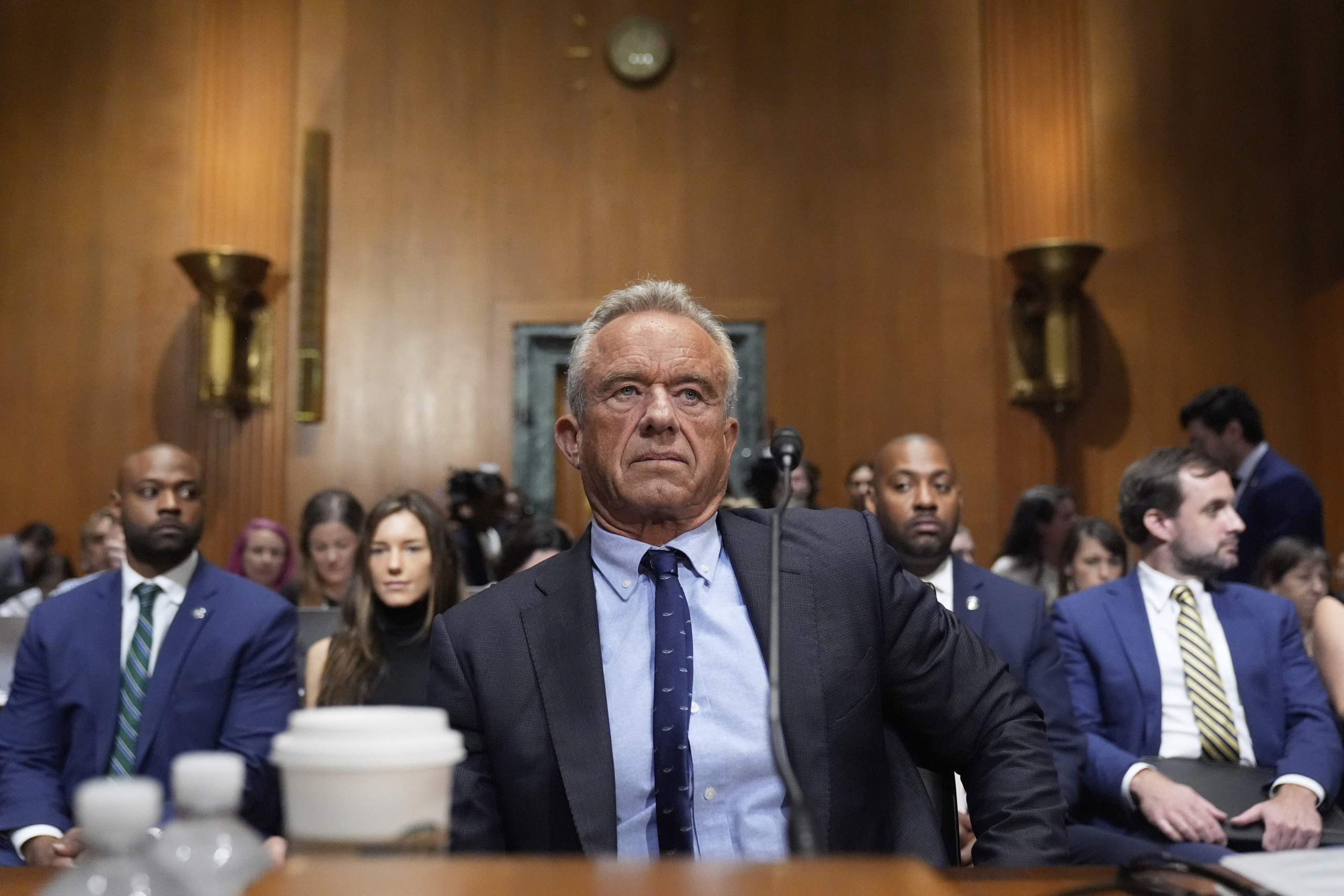Thought of the Day

“The best preparation for tomorrow is doing your best today.” – H. Jackson Brown Jr


“The best preparation for tomorrow is doing your best today.” – H. Jackson Brown Jr

By GARY D. ROBERTSON Associated Press
FLETCHER, N.C. (AP) — North Carolina Gov. Josh Stein has taken an unusual approach with Republican political opponents in his first eight months leading a highly competitive state where divided government has become the norm.
He’s trying to get along with them.
Stein, who succeeded fellow Democrat Roy Cooper in January, has made an effort to work with the GOP-controlled General Assembly on things like storm recovery — still a top priority nearly a year since Hurricane Helene’s historic flooding — and on other issues broadly popular with North Carolinians.
He’s kept communication lines open with legislative leaders, even as they back President Donald Trump and oppose many Stein policy prescriptions.
The public, Stein said in an interview with The Associated Press, doesn’t “care whether I’m a Democrat or Republican, or that the legislature is a Democrat- or Republican-led body.”
“What they want is for whoever are in these positions to get things done that make their lives better, and that’s my job,” he added. “So I will work with whoever I need to in order to make progress for the people of North Carolina.”
His results have been mixed so far. The General Assembly passed storm-relief packages but gave Stein roughly a little over half the money he requested. It overrode several of his vetoes on bills that build up immigration enforcement, weaken transgender rights and assert other GOP priorities — results that Stein laments.
But Republicans, including some who gathered with Stein at a barbecue in the mountains recently to honor local government workers’ hurricane recovery efforts, have taken notice of the efforts he’s made.
“We appreciate everything that he’s done for us,” said Larry Chapman, a Transylvania County commissioner and Trump supporter. “I’m encouraged with Stein — he seems to be a lot more interested in getting out with the people and listening to people more.”
Stein’s approach comes as Democratic governors nationwide struggle to navigate Republican gains and Trump’s sprawling agenda. While some chief executives have taken more combative stances against Trump and the GOP, others have opted for diplomacy.
Stein told those gathered in Fletcher that he was their ally on Helene, which caused more than 100 deaths in North Carolina and generated $60 billion in damages and needs. He did not mention political affiliation.
“You and your constituents have been busting your tails to come back, and come back stronger than ever,” Stein said to hundreds at a park submerged during Helene. “I want you to know that I am in your corner.”
Stein, the former attorney general, shares many views with Cooper, who early on clashed with Republicans over the ‘bathroom bill” lawmakers enacted and sued them over laws that eroded his powers. Those clashes set a tone of distrust that wasn’t eliminated during his eight years at the job. Cooper is now running for the U.S. Senate.
While Stein also has sued over GOP power grabs, he’s needed good relations with Republicans on storm relief and other topics. He’s speaking regularly with new Republican House Speaker Destin Hall, longtime Senate leader Phil Berger and other legislators.
“We have differences with him on certain policies and certain processes,” Berger said recently. But, he added, “I would say that there’s still what I would consider to be a very good relationship on a personal basis with Gov. Stein.”
Stein, himself a lawmaker until 2016, has shared credit with Republicans, inviting them to signings of bipartisan bills. Last week, Stein named a GOP legislator to co-chair an energy affordability task force.
There “was a lot of fatigue from the last eight years, of everything was a battle,” said state Rep. Jake Johnson, another Republican. “It felt like you were just having to fight to get anything done.”
By North Carolina standards, Stein still has used his veto stamp frequently — 15 times so far.
He rejected measures that would expand gun access and eliminate diversity, equity and inclusion programs.
“Because you respect the people you deal with, because you’re civil with the people you deal with, doesn’t mean you don’t have real disagreements,” Stein said. “When they pass legislation that makes the state less safe or less strong, I’ll veto them.”
Berger said the vetoes prove Stein is more left-leaning than he’s portrayed himself to be.
Democrats hold the minimum number of seats necessary to uphold Stein’s vetoes if they remain united. But Stein was unable to hold them together on eight vetoes — as one to three House Democrats joined Republicans in voting to override them.
Another major veto decision looms if there’s a final state budget, now two months overdue.
“Stein has lost some big-time issues” this year, Meredith College political science professor David McLennan said. “But it doesn’t mean that he’s not a successful governor in his first year.”
Stein’s latest trip to western North Carolina marked his 34th separate day spent in the region as governor, reflecting a promise to rebuild “a more resilient region for the long haul.”
“A lot of the job is showing up,” said Chuck McGrady, a former Republican legislator from the mountains. “He is meeting with a wide range of people, and I think he’s gotten very high grades from folks, regardless of their politics.”
Helene’s recovery began during presidential and gubernatorial campaigns and prompted accusations by Trump and allied Republicans that the response from Democratic administrations was weak.
Stein included Johnson and McGrady, now an unaffiliated voter, on a recovery committee. And he created a recovery agency separate from a Cooper-era office criticized for housing repair delays after hurricanes Matthew and Florence. Stein met Trump when the president visited the hard-hit region during his first days in office.
Stein said this week he’s seeking an additional $11.5 billion in aid from Congress. His administration says financial assistance received so far from the federal government as a percentage of total damages and needs is small compared with what was provided after other recent U.S. hurricanes.
A White House spokesperson responded, saying the “request is evidence that he is unfit to run a state.” Other Republicans previously said Stein’s administration hasn’t converted what money it’s received to repairs fast enough.
Stein still thinks he can get his messages across without trying to show anybody up.
“I think you can disagree with folks and still be civil, and so when I have concerns about what the administration is doing, I have no hesitation to say what I believe when it hurts North Carolina,” he said.

By MATT BROWN and MIKE STOBBE Associated Press
WASHINGTON (AP) — U.S. Health Secretary Robert F. Kennedy Jr., facing pointed bipartisan questioning at a rancorous three-hour Senate committee hearing on Thursday, tried to defend his efforts to pull back COVID-19 vaccine recommendations and explain the turmoil he has created at federal health agencies.
Kennedy said the fired CDC director was untrustworthy, stood by his past anti-vaccine rhetoric, and disputed reports of people saying they have had difficulty getting COVID-19 shots.
A longtime leader in the anti-vaccine movement, Kennedy has made sweeping changes to agencies tasked with public health policy and scientific research by laying off thousands of workers, firing science advisers and remaking vaccine guidelines. The moves — some of which contradict assurances he made during his confirmation hearings — have rattled medical groups and officials in several Democratic-led states, which have responded with their own vaccine advice.
Medical groups and several Democrats in Congress have called for Kennedy to be fired, and his exchanges with Democratic senators on the panel repeatedly devolved into shouting, from both sides.
But some Republican senators also expressed unease with his changes to COVID-19 policies.
The GOP senators noted that Kennedy said President Donald Trump deserved a Nobel Prize for the 2020 Operation Warp Speed initiative to quickly develop mRNA COVID-19 vaccines — and that he also had attacked the safety and continued use of those very shots.
“I can’t tell where you are on Operation Warp Speed,” said Republican North Carolina Sen. Thom Tillis.
Tillis and others asked him why the director of the Centers for Disease Control and Prevention was fired last week, less than a month into her tenure.
Kennedy said she was dishonest, and that CDC leaders who left the agency last week in support of her deserved to be fired.
He also criticized CDC recommendations during the COVID-19 pandemic tied to lockdowns and masking policies, and claimed — wrongly — that they “failed to do anything about the disease itself.”
“The people at CDC who oversaw that process, who put masks on our children, who closed our schools, are the people who will be leaving,” Kennedy said. He later said they deserved to be fired for not doing enough to control chronic disease.
The Senate Finance Committee had called Kennedy to a hearing about his plans to “Make America Healthy Again,” but Democratic senators pressed Kennedy on his actions around vaccines.
At the start of the hearing, Sen. Ron Wyden of Oregon tried to have Kennedy formally sworn in as a witness, saying the HHS secretary has a history of lying to the committee. The committee’s chair, Sen. Mike Crapo of Idaho, denied the Democrat’s request, saying “the bottom line is we will let the secretary make his own case.”
Wyden went on to attack Kennedy, saying he had “stacked the deck” of a vaccines advisory committee by replacing scientists with “skeptics and conspiracy theorists.”
Last week, the Trump administration fired the CDC’s director — a Trump appointee who was confirmed by the Senate — less than a month into her tenure. Several top CDC leaders resigned in protest, leaving the agency in turmoil.
The ousted director, Susan Monarez, wrote in The Wall Street Journal on Thursday that Kennedy was trying to weaken public health protections.
“I was told to preapprove the recommendations of a vaccine advisory panel newly filled with people who have publicly expressed antivaccine rhetoric,” Monarez wrote. “It is imperative that the panel’s recommendations aren’t rubber-stamped but instead are rigorously and scientifically reviewed before being accepted or rejected.”
Kennedy told senators he didn’t make such an ultimatum, though he did concede that he had ordered Monarez to fire career CDC scientists. Monarez’s attorneys later responded that she stood by the op-ed and “would repeat it all under oath.”
Kennedy pushed back on concerns raised by multiple Republican senators, including Tillis and Sens. John Barrasso of Wyoming and Bill Cassidy of Louisiana. Both Barrasso and Cassidy are physicians.
The health secretary had animated comebacks as Democratic senators pressed him on the effects of his words and actions.
When Sen. Raphael Warnock, of Georgia, questioned Kennedy about his disparaging rhetoric about CDC employees before a deadly shooting at the agency this summer, Kennedy shot back: “Are you complicit in the assassination attempts on President Trump?”
Kennedy called Sen. Ben Ray Lujan of New Mexico “ridiculous,” said he was “talking gibberish” and accused him of “not understanding how the world works” when Lujan asked Kennedy to pledge to share protocols of any research Kennedy was commissioning into autism and vaccines.
He also engaged in a heated, loud exchanges with Sens. Elizabeth Warren of Massachusetts and Tina Smith of Minnesota.
“I didn’t even hear your question,” Kennedy replied to Sen. Catherine Cortez Masto as the Nevada Democrat repeatedly asked what the agency was doing to lower drug costs for seniors.
He also told Sen. Bernie Sanders that the Vermont independent was not “making any sense.”
Some senators had their own choice words.
“You’re interrupting me, and sir, you’re a charlatan. That’s what you are, ” said Sen. Maria Cantwell, a Washington Democrat. “The history on vaccines is very clear.”
As the hearing neared its end, Kennedy pulled his cellphone from his pocket and then tapped and scrolled as Wyden asked about mifepristone, a drug used for medication abortion.
In May, Kennedy announced COVID-19 vaccines would no longer be recommended for healthy children and pregnant women, a move opposed by medical and public health groups.
In June, he abruptly fired a panel of experts that had been advising the government on vaccine policy. He replaced them with a handpicked group that included several vaccine skeptics, and then shut the door to several doctors groups that had long helped form the committee’s recommendations.
Kennedy has voiced distrust of research that showed the COVID-19 vaccines saved lives, and at Thursday’s hearing even cast doubt on statistics about how people died during the pandemic and on estimates about how many deaths were averted — statistics produced by the agencies he oversees.
He said federal health policy would be based on gold standard science, but confessed that he wouldn’t necessarily wait for studies to be completed before taking action against, for example, potential causes of chronic illness.
“We are not waiting for everything to come in. We are starting now,” he said.
A number of medical groups say Kennedy can’t be counted on to make decisions based on robust medical evidence. In a statement Wednesday, the Infectious Diseases Society of America and 20 other medical and public health organizations issued a joint statement calling on him to resign.
“Our country needs leadership that will promote open, honest dialogue, not disregard decades of lifesaving science, spread misinformation, reverse medical progress and decimate programs that keep us safe,” the statement said.
Many of the nation’s leading public health and medical societies, including the American Medical Association, American Public Health Association and the American Academy of Pediatrics have decried Kennedy’s policies and warn they will drive up rates of vaccine-preventable diseases.
___
Stobbe reported from New York. Associated Press writer Mary Clare Jalonick contributed to this report.
___
The Associated Press Health and Science Department receives support from the Howard Hughes Medical Institute’s Department of Science Education and the Robert Wood Johnson Foundation. The AP is solely responsible for all content.

By MARK LONG AP Pro Football Writer
JACKSONVILLE, Fla. (AP) — Although much of the focus remains on quarterbacks and former No. 1 overall draft picks Bryce Young and Trevor Lawrence, the Carolina Panthers and Jacksonville Jaguars have an equally important question heading into their season opener Sunday:
Which team has improved the most on the other side of the ball?
The Panthers and Jaguars ranked 32nd and 31st, respectively, in total defense in 2024. Carolina couldn’t stop the run, especially with Pro Bowl defensive lineman Derrick Brown (knee) sidelined 16 games. Jacksonville, meanwhile, bulked up in the weight room and then did little to affect opposing passers, managing 34 sacks and six interceptions.
Dismal defenses contributed to abysmal seasons — and led to offseason overhauls for both teams.
Carolina (5-12 last year) fired two defensive assistants and committed nearly $150 million to some key free agents, most notably adding defensive end Tershawn Wharton, safety Tre’von Moehrig and linebacker Patrick Jones. The Panthers then added linebackers Princely Umanmielen and Nic Scourton during the second night of the NFL draft.
Jacksonville (4-13), with a new regime led by coach Liam Coen and general manager James Gladstone, brought in cornerback Jourdan Lewis, safety Eric Murray, linebacker Dennis Gardeck and defensive ends Emmanuel Ogbah and Dawuane Smoot in free agency before trading up to grab cornerback/receiver Travis Hunter second overall in the draft.
The newcomers are expected to get a chance to make a difference in the opener.
“I’m excited. I think all those new guys are excited,” Jaguars defensive end Josh Hines-Allen said. “We’ve got a grasp of how we’re going to play this year, what we’re expecting up front and just letting it go.”
Jacksonville continues to revamp its defense, too. After struggling to stop the run in training camp, the Jags signed nose tackle Austin Johnson and traded for fellow veteran Khalen Saunders.
The middle of Carolina’s defense is expected to get a boost from the return of Brown, who notched a whopping 103 tackles in 2023. Without him, the Panthers allowed a franchise-record and NFL-high 534 points.
“As a competitor you are supposed to have a chip on your shoulder whenever you lay an egg like that,” Panthers cornerback Jaycee Horn said. “You never want to be on the wrong side of history. So everybody on the defense should be coming into this year with a chip on their shoulder and something to prove.”
Coen, who like Carolina’s Dave Canales is a former Tampa Bay offensive coordinator, will make his regular-season debut as a head coach. He has several concerns: How will the Jaguars run the ball? How will they defend on the perimeter? And how will they handle adversity?
“How are we going to respond?” he said. “You don’t truly, truly know.”
Young enters a pivotal Year 3. The top draft pick in 2023 is just 6-22 as a starter and was benched two games into last season. He finished strong, though, accounting for 10 touchdowns and no turnovers over the final three games.
“I’m not a big look-in-the-rearview kind of guy,” Young said. “I’m excited for this year. I’m excited for this group this year, and I feel great.”
Lawrence, meanwhile, is working in his third offense in five seasons. His NFL career has been filled with offensive dysfunction. But he believes the Jaguars will be a tough, physical team that’s situationally smart under Coen.
“There’s always uncertainty in football, especially playing quarterback,” said Lawrence, who missed seven of the final eight games last season. “You want every play to go the way you have it planned, but it never does. It’s about playing in that gray and making smart decisions and just playing fast, trusting what you see.
“It’s been a long time. I’m excited to get out there.”
All eyes will be on the 2024 Heisman Trophy winner from Colorado. Hunter will play on offense and defense as he tries to become the NFL’s first full-time, two-way player in the Super Bowl era.
Hunter is expected to serve as Jacksonville’s slot receiver in three-receiver sets, playing alongside Brian Thomas Jr. and Dyami Brown. And he will be an outside cornerback in nickel defense, with Jourdan Lewis moving into the slot.
“I don’t know what they’re going to do with him,” Canales said. “Is he going to return punts for them?”
Travis and Trevor Etienne, brothers born five years apart in Jennings, Louisiana, will be on opposite sidelines for the opener. Travis is Jacksonville’s starting running back and the Atlantic Coast Conference’s all-time leading rusher. Trevor, who played at Florida and Georgia, is a rookie running back for Carolina who will serve as the team’s primary returner.
“I want him to have the best game ever,” Trevor said. “They just can’t win. That’s it.”

This breakfast recipe is short and sweet–and makes for a great start to your day.
1. Start the batter
In a medium-sized mixing bowl, mash the bananas until mostly smooth. Then, whisk in the eggs until they are fully incorporated into the bananas.
2. Add remaining ingredients
Incorporate the flour, vanilla extract and cinnamon into the batter and stir until combined. If desired, add a splash of milk or milk substitute for less dense pancakes.
3. Cook the pancakes
Heat a skillet on medium-low heat and lightly coat with butter or oil. Then, scoop about 1/4 cup of batter onto the prepped skillet and cook for 2-3 minutes or until bubbles form. Next, flip the pancake and cook on the other side for another 1-2 minutes, or until golden brown. Repeat the process for each pancake.
4. Toppings time
(Optional) Top your pancakes with butter, maple syrup, brown sugar, more sliced bananas, or anything else you’d like.
5. Serve them up
Serve immediately and enjoy this delicious and filling breakfast!


Optimism is a happiness magnet.

By COLLIN BINKLEY and MICHAEL CASEY Associated Press
BOSTON (AP) — A federal judge in Boston on Wednesday ordered the Trump administration to reverse its cuts of more than $2.6 billion in research funding for Harvard University, delivering a significant victory to the Ivy League school in its battle with the White House.
U.S. District Judge Allison Burroughs ruled the cuts amounted to illegal retaliation for Harvard’s rejection of the Trump administration’s demands for changes to Harvard’s governance and policies.
The government had tied the funding freezes to Harvard’s delays in dealing with antisemitism, but the judge said the university’s federally backed research had little connection to discrimination against Jews.
“A review of the administrative record makes it difficult to conclude anything other than that (the government) used antisemitism as a smokescreen for a targeted, ideologically-motivated assault on this country’s premier universities,” Burroughs wrote. The country must fight antisemitism, she wrote, but it also must protect the right to free speech.
The ruling reverses a series of funding freezes that later became outright cuts as the Trump administration escalated its fight with the nation’s wealthiest university. The administration also has sought to prevent the school from hosting foreign students and threatened to revoke its tax-exempt status in a clash watched widely across higher education.
The restoration of federal money would revive Harvard’s sprawling research operation and hundreds of projects that sustained cuts. But whether Harvard actually receives the federal money remains to be seen. The government plans an immediate appeal, White House spokeswoman Liz Huston said in a statement, calling Burroughs an “activist Obama-appointed judge.”
“To any fair-minded observer, it is clear that Harvard University failed to protect their students from harassment and allowed discrimination to plague their campus for years,” Huston said. “Harvard does not have a constitutional right to taxpayer dollars.”
Harvard President Alan Garber foreshadowed potential battles to come even as he said the ruling validates Harvard’s fight for academic freedom.
“Even as we acknowledge the important principles affirmed in today’s ruling, we will continue to assess the implications of the opinion, monitor further legal developments, and be mindful of the changing landscape in which we seek to fulfill our mission,” Garber wrote in a campus message.
Harvard’s research scientists said they had been watching the case closely but feared their funding would not be restored anytime soon.
“Many of us are worried that the federal government is going to appeal this decision or find other ways to obstruct the delivery of research dollars, despite the judge’s clear statement that the funding terminations were illegal,” said Rita Hamad, director of a center that researches the impact of social policies on health.
Beyond the courthouse, the Trump administration and Harvard officials have been discussing a potential agreement that would end investigations and allow the university to regain access to federal funding. President Donald Trump has said he wants Harvard to pay no less than $500 million, but no deal has materialized, even as the administration has struck agreements with Columbia and Brown.
Wednesday’s federal court ruling should embolden Harvard’s administration, said historian Kirsten Weld, president of Harvard’s chapter of the American Association of University Professors, which also prevailed in a lawsuit over the funding cuts. “We hope this decision makes clear to Harvard’s administration that bargaining the Harvard community’s rights away in a compromise with the government is unacceptable,” Weld said.
Harvard’s lawsuit accused the Trump administration of waging a retaliation campaign against the university after it rejected a series of demands in an April 11 letter from a federal antisemitism task force.
The letter demanded sweeping changes related to campus protests, academics and admissions. It was meant to address government accusations that the university had become a hotbed of liberalism and tolerated anti-Jewish harassment on campus.
Harvard President Alan Garber pledged to fight antisemitism. But, he said, no government “should dictate what private universities can teach, whom they can admit and hire, and which areas of study and inquiry they can pursue.”
Trump officials moved to freeze $2.2 billion in research grants the same day Harvard rejected the administration’s demands. Education Secretary Linda McMahon declared in May that Harvard would no longer be eligible for new grants, and weeks later, the administration began canceling contracts with Harvard.
As Harvard fought the funding freeze in court, individual agencies began sending letters announcing that the frozen research grants were being terminated under a clause allowing grants to be scrapped if they no longer align with government policies. Harvard has moved to self-fund some of its research but warned it can’t absorb the full cost of the federal cuts.
The judge’s order reverses all of Harvard’s federal funding freezes and cuts since April 14, and it bars the government from future cuts that violate Harvard’s constitutional rights or run afoul of federal law.
Burroughs sided with the university’s argument that the cuts amounted to retaliation in violation of its First Amendment rights and that the government put unconstitutional conditions on Harvard’s federal money.
“As pertains to this case, it is important to recognize and remember that if speech can be curtailed in the name of the Jewish people today, then just as easily the speech of the Jews (and anyone else) can be curtailed when the political winds change direction,” the judge wrote.
Burroughs also agreed with Harvard’s claim that the government failed to follow steps prescribed by Congress to cut federal money under Title VI of the Higher Education Act, a federal law that forbids discrimination in education.
The Trump administration denied the cuts were made in retaliation, saying the grants were under review even before the April demand letter was sent. It argues the government has wide discretion to cancel contracts for policy reasons.
“It is the policy of the United States under the Trump Administration not to fund institutions that fail to adequately address antisemitism in their programs,” it said in court documents.
In a separate lawsuit filed by Harvard, Burroughs previously blocked the Trump administration’s efforts to prevent the school from hosting international students.
___
Binkley reported from Washington, D.C. AP reporter Aamer Madhani contributed from Washington.

POWELLS POINT, N.C. (AP) — A coastal North Carolina legislator announced his bid on Wednesday for a U.S. House seat next year, looking to unseat Democratic incumbent Don Davis in what is now the state’s currently only swing congressional district.
State Sen. Bobby Hanig of Currituck County said he would seek the Republican nomination for the sprawling 1st Congressional District, which covers 22 counties from the northern Outer Banks to the Raleigh metro area’s outskirts.
Davis and Rocky Mount Mayor Sandy Roberson, also a Republican, have already filed federal candidate paperwork for the 1st District seat in 2026. The official state election filing period is in December, with primaries set for early March.
Republicans currently hold 10 of North Carolina’s 14 U.S. House seats, with the 1st District seat the only other one for which the GOP has been competitive. The November 2026 outcome will be watched closely given the Republicans’ narrow U.S. House majority and efforts in other states to redraw congressional maps to favor one major party or the other.
Hanig, who was initially elected to the state House in 2018 before moving to the Senate in 2022, highlighted his support for President Donald Trump’s policies and his legislative record with his entry.
“I’m a proven leader who has always been a fierce advocate for my constituents and our shared values and beliefs,” Hanig said in a news release. “I will continue that fight when I get to Washington.”
Davis, himself a former state senator, won the 1st District seat in 2022 by defeating Republican Sandy Smith, and earned a second term last fall over Republican Laurie Buckhout by less than 2 percentage points.
Roberson, who lost the GOP nomination to Smith in 2022, reported to the Federal Election Commission raising nearly $2.3 million for his campaign committee in the second quarter, of which $2 million came from his personal funds.
Hanig, a business owner and former Currituck County commissioner chairman, is perhaps best known at the Legislative Building for wearing colorful and striking suit jackets.
Hanig clashed with state Senate GOP leaders this year while opposing their efforts to ban inshore and coastal shoreline shrimp trawling. The legislation petered out in the House after shrimp industry members and their allies rallied in Raleigh against it.

By AARON BEARD AP Sports Writer
CHAPEL HILL, N.C. (AP) — North Carolina’s opening-night show under Bill Belichick was a flop. The only good news is there’s little time to dwell on it.
Instead, Belichick’s first college team is hurtling straight from a 48-14 loss to TCU on Labor Day to Saturday’s kickoff at Charlotte, a brisk turnaround for a team with a long list of items on the repair list.
“You can’t particpate in a game like that and not feel like there’s some things you could’ve done better or you’d like to do over again,” Belichick said Wednesday. “Learn from those, move on and get ready for Charlotte. That’s all we can control.
“We need to learn some lessons from what happened in the TCU game. But at the same time, there’s nothing we can do about that one, it’s over with, and we need to move on.”
UNC turned to the 73-year-old coach who won six Super Bowls in leading the NFL’s New England Patriots in a bid to elevate a program beyond decades of also-ran status, including paying Belichick a guaranteed $10 million for each of his first three seasons.
Things began with a brief high point of a crisp season-opening touchdown drive and an immediate defensive stand. What followed was a gamelong descent that picked up speed on the way to a third-quarter crash that emptied out a packed Kenan Stadium well before the final period, all coming with the eyes of the college football world locked on Chapel Hill.
Belichick said the goal now was to move past the TCU loss “as fast as we can” and sort out what works, what doesn’t and what can improve quickly.
“I think as a coach you always try to do what’s best for your team, period, whatever that is,” Belichick said. “So you try to put players in the best position you can put them in. That’s your job as a coach.
“That’s what I’ve always tried to do, is give my players an opportunity to go out there and play well and do things they’re confident in doing and capable of doing. I’d say based on Monday night, I need to do a better job of that.”
By the end, UNC had given up the most points in an opener in program history. The Horned Frogs also posted the highest score allowed by a Belichick-coached team at any level going back to his 29-year run as an NFL head coach, the previous high being 47 points against the Buffalo Bills in a 2021 wild-card playoff game.
TCU scored 41 straight points after falling behind 7-0. That also created a rare scenario: there had been only four games in Belichick’s 511 NFL regular-season and playoff games that he had trailed by at least 34 points.
One of those was a 41-14 loss at Kansas City in September 2014, prompting Belichick’s famous “We’re on to Cincinnati” repeated response to reporters’ questions in a year that ended with the Pats winning title No. 4 under Belichick.
Belichick wasn’t nearly as terse Wednesday, giving thorough responses to questions about how the Tar Heels can move forward and what’s next. His players were following his lead, too.
“Man, we just move forward,” linebacker Khmori House said.
“Just turn that next page,” running back Caleb Hood said. “Put TCU to bed, that was last week, and control what we can control.”
Belichick shrugged off the question about whether his players could have wounded morale or confidence based on the jarring result, which stood in stark contrast to the buzz teeming through campus in the days leading up to the opener and that night in Kenan.
He could point to cleaning up problems that led to TCU scoring on a pick-six and a scoop-and-score for a pair of defensive touchdowns as examples of self-inflicted wounds. He could also point to a line of execution failures that compounded as TCU took over, from the Tar Heels managing just 139 yards on 42 plays (3.31 per-play average) after their game-opening TD drive to TCU finishing with 320 more yards (542) overall.
Rather, he pointed to the idea that every game is “an opportunity.” The test is finding out how this team responds to that message.
“We’ve spent a lot of time together and practiced a lot together, met together a lot, going back to February and January, whatever,” said Brian Belichick, Belichick’s son and UNC’s defensive backs/safeties coach.
“We’ve built up a lot of confidence in each other and trust in each other. The game ends up not going the way we want and I said it to some of the guys yesterday: ‘One night doesn’t define any of us.’”

FAYETTEVILLE, N.C. (WPTF) – Fayetteville State University is experiencing another year of record enrollment while also posting some of the strongest academic gains in its history, school leaders announced Tuesday.
For the fourth straight year, FSU reached an all-time high enrollment with 7,628 students, surpassing last year’s record of 7,100 by more than 500. The freshman class is the largest since 2007 with 820 students, who arrived with an average GPA of 3.32.
The university also reported a 78% student retention rate, a 15-point increase since 2021.
“At Fayetteville State University, it’s more than just numbers, but the quality within our numbers,” Chancellor Darrell T. Allison said. He credited affordable tuition, high-demand programs and a focus on graduating students in four years or less.
Part of the growth has been fueled by FSU’s inclusion in the NC Promise program, which began covering the university in 2022. The initiative, backed by the General Assembly, lowers in-state tuition at participating institutions to $500 per semester and $2,500 for out-of-state students.
Provost Monica T. Leach said undergraduate programs in business administration, nursing and forensic science remain strong, while newer offerings in cybersecurity, sports and fitness management, computer science, construction project management and supply chain management are seeing notable growth.
The school also enrolled more than 2,500 military-affiliated students this year, the highest in its history, and continues to serve more than 1,100 transfer students annually.
Pamela Baldwin, vice chancellor for strategic enrollment and student success, said FSU’s efforts are focused on making education affordable and flexible. “Growth alone is never enough; what matters is what we do with it,” she said.